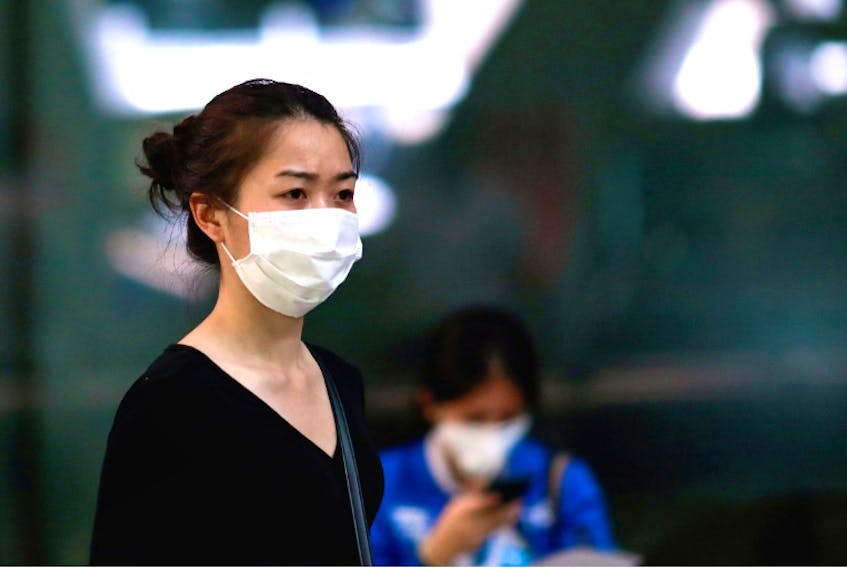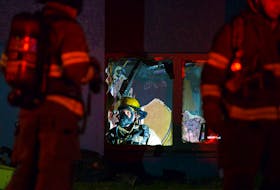ST. JOHN'S, N.L. — As concerns grow globally about the spread of coronavirus, so are local sales of protective face masks.
“We can’t keep them on the shelves,” St. John’s pharmacy technician Cecilia Spurvey told The Telegram Wednesday. “They’re selling like crazy. After Snowmageddon, we’ve sold thousands.”
Spurvey, who works at Shoppers Drug Mart on Rowan Street, said since their store is located near Memorial University, she isn’t surprised to see a boost in sales, as many of their customers are foreign students. She said in recent weeks a large number them have come to the store looking for the face masks.
“Most people are coming in before they travel and taking them on trips,” she said. “Others are students who buy them and send them back to China.”
Face masks have been in high demand around the world since China publicly stated on Dec. 31 that a novel coronavirus (2019-nCoV) has been responsible for many of the cases of pneumonia in the Wuhan outbreak.
“We can’t keep them on the shelves. They’re selling like crazy." — St. John’s pharmacy technician Cecilia Spurvey
According to the World Health Organization (WHO), coronaviruses are a large family of viruses that cause illness ranging from the common cold to more severe diseases with serious respiratory conditions. The novel coronavirus is a new strain that had not been previously identified in humans.
Common signs of infection include respiratory symptoms, fever, cough, shortness of breath and breathing difficulties. In more severe cases, infection can cause pneumonia, severe acute respiratory syndrome, kidney failure and, more rarely, death.
There is evidence of person-to-person spread with close contact with those infected.
As of Wednesday, there were 24,554 confirmed cases of novel coronavirus worldwide, the WHO reports. A total of 24,363 of those are in China.
The worldwide death toll from the novel coronavirus has reached just over 490 people.

Five cases of the virus have been confirmed in Canada — three in Ontario and two in British Columbia — with one of the B.C. cases under investigation. In three of those cases, patients have reported travel history to China.
There have been no confirmed cases in Newfoundland and Labrador.
Experts in the province’s Department of Health and Community Services have stated the overall public health risk to Canada and Canadian travellers remains low.
But it seems some people aren’t taking chances.
Spurvey said their store is out of stock of face masks, as the supplier is waiting for more, but they’re expecting a shipment to arrive in the next day or two.
Jessica Adams, floor manager at Home Hardware on Torbay Road, said staff have noticed customers requesting N95 respirator face masks, which are said to be more effective in protection against liquid and airborne particles.
“We just had a really big order,” Adams said. “(Head office) put out a notice to us to be (ready) because it’s going to be a very hot item coming up.
“This is the first panic I’ve seen for masks.”

People have also been ordering them online. Some popular online shopping sites have reportedly been running low on N95 face masks.
The rising demand has prompted the Better Business Bureau (BBB) to issue warnings about scammers.
Kristin Matthews, marketing and communications manager for BBB for the Atlantic provinces, said fake websites are taking advantage of people’s fears about the coronavirus.
“A lot of these masks are getting bought by people who are getting totally freaked out, and scammers will prey on this,” said Matthews, who recommends people check to ensure the company is reputable and has a lock symbol displayed to the left of its website address. “People really need to be careful and think before they click on something.”
Dr. Janice Fitzgerald, the province’s chief medical officer of health, said her office is working closely with the Department of Health and Community Services, along with the Public Health Agency of Canada (PHAC) and the WHO, to closely monitor the situation and ensure procedures are in place to deal with the issue.
Fitzgerald said the risk of contracting the virus is low for residents of Newfoundland and Labrador, but is higher for those travelling to specific areas of the world.
In most cases, she said, the symptoms of the novel coronavirus are minor and people don’t need hospitalization. While there’s no anti-viral medication, the province’s health system is equipped to provide supportive treatment, she said .
Like some other viruses, the coronavirus is spread by droplets that come out of the mouth and nose when coughing or sneezing, she said, and the best preventative measure is to “clean, cover and contain.” She recommends that when washing their hands, people lather with soap for 15 seconds, and that they cough or sneeze into their sleeve or a tissue, and avoid touching their face.
“Any time we have something new that’s happened from a medical point of view, it’s always concerning for people and we understand that concern,” Fitzgerald said. “It’s evolving and information seems like it’s changing daily, so it can be confusing for people.”
For reliable information about the virus and updates, Fitzgerald recommends residents visit the websites for health and community service (www.health.gov.nl.ca/health/publichealth/cdc/coronavirus/), PHAC (www.canada.ca/en/public-health.html) and the WHO (www.who.int).
Twitter: @TelyRosie









